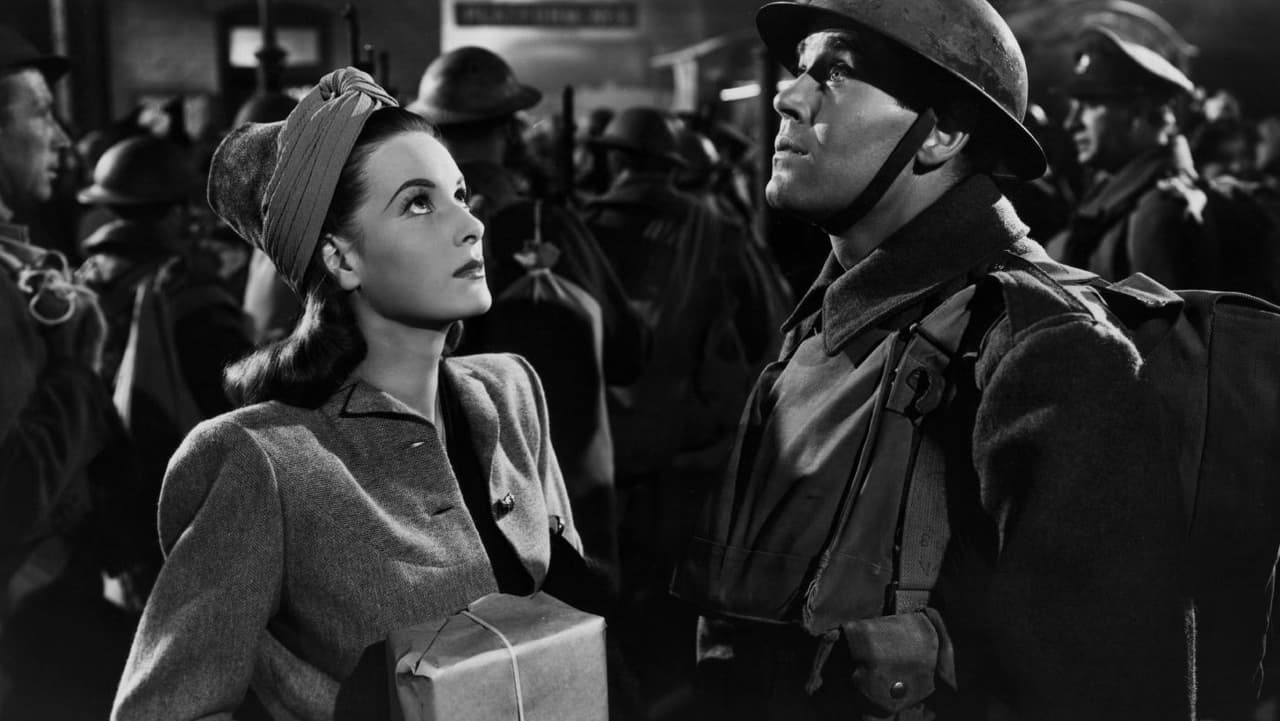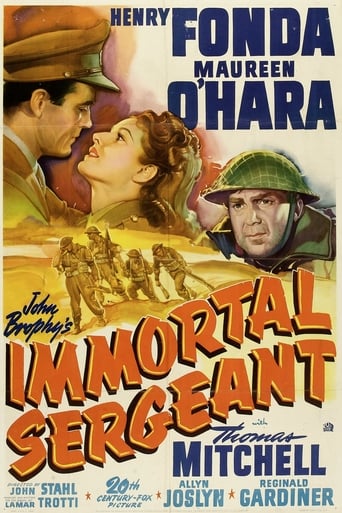



Excellent, Without a doubt!!
Crappy film
Entertaining from beginning to end, it maintains the spirit of the franchise while establishing it's own seal with a fun cast
View MoreThis movie feels like it was made purely to piss off people who want good shows
View More1943's The Immortal Sergeant is a tedious and overly melodramatic bit of dullness that makes you glad we won WWII. But how? I never got a chance to suspend my disbelief with this movie. Every moment I saw characters running hither and yon, pursuing Nazis or being strafed, I reacted with a dull, throbbing irritation. The movie is so drab that whatever does get done right gets lost in the wrong. Henry Fonda, the young Canadian soldier in the Royal Army, is such a wussburger, he's willing to let Maureen O'Hara go to a teddibly uppa-crust war correspondent (Allyn Joslyn) instead of popping him in the nose. He whines to his sergeant (the immortal one--Thomas Sullivan) that he can't have a rank of responsibility. When he takes over the patrol, he has to quell a mutiny, slaughter a bunch of Italians and Germans, and make it back to base, all the while being crippled by some of the most boring flashbacks I've ever seen. By the time our hero gets a medal pinned on his hospital robe (yeah, he makes it), he has turned in to a nasty, kill-em-all-and-let-God- sort-them-out candidate for a commission. He tells the teddible war correspondent that if he doesn't get a letter to O'Hara telling her he wants to marry her, he'll murder the journalist friend.Sheesh, not "I'll smack ya in the kisser" or "I'll dance on your head, but "I'll murder you."So much for Mr. Nice Wussburger. I think I liked him better.The Immortal Sergeant didn't teach that to Corporal Jackass.
View MoreAverage war drama based on a John Brophy novel. The immortal sergeant is British Sgt. Kelly(Thomas Mitchell)in charge of a 14-man patrol in the desert of WWII Libya. Kelly is tough, but compassionate and held in high regard by the men in his unit. The group becomes smaller as only six survive an air attack in the open desert. Kelly's corporal is Colin Spence(Henry Fonda), a shy and laid back Canadian with enough military smarts to impress the sergeant in picking him as his replacement. The fatigued patrol comes face to face with a Nazi tank and after a harsh confrontation Spence is forced to step up and take the place of their fallen leader.The photography for this war drama is very good for the mid-40's. Black & White film sets the mood and feel of the movie well. The action is broken up with Spence's flashback reminiscing of the girl he left behind, the beautiful Maureen O'Hara. Also in the cast: Reginald Gardner, Allyn Joslyn, Melville Cooper, Morton Lowry, John Banner and a small role for Peter Lawford.
View MoreIn his memoirs Henry Fonda hated this film above all others that he did in his career. That's taking in quite a bit of territory because Fonda did some dreadful stuff in the seventies like Tentaccoli with a giant octopus. A lot of this was done for the money and Fonda with five wives certainly had much expenses in alimony.But Immortal Sergeant held a place dear in his heart because of the head of 20th Century Fox, Darryl F. Zanuck. Back in 1940 in order to get the part of Tom Joad, Fonda made a faustian deal with Zanuck signing his only studio contract. The studio cast him in what he considered junk. The good films he made in that four year stretch were on loan out, to Paramount for The Lady Eve, to Warner Brothers for The Male Animal, to RKO for The Big Street. He was not fond of what Fox cast him in for the most part because he got what was left after Tyrone Power and Don Ameche rejected it.Anyway come 1943 Fonda had two objectives, to make The Oxbow Incident because he knew that would be a classic and to enlist in World War II as pal Jimmy Stewart did. He prevailed on Zanuck to do The Oxbow Incident and it was a cheaply made western, classic though it was because it was shot completely on the sound stage. Then Zanuck cajoled, begged, and pleaded with him to make this one more film which he said was a great propaganda piece one that would tear the hearts of the movie going public and rally the homefront and be an inspiration to the fighting troops.When Immortal Sergeant proved somewhat less than that, Fonda felt hoodwinked and gritted his teeth and finished the film. He tried in fact to enlist to get out of it and Zanuck had so much pull in Washington, DC, Fonda kept getting his enlistment postponed.It was one angry Henry Fonda who finished The Immortal Sergeant and then went to war. His experience with this film made him bound and determined to get out of his contract one way or another. Ultimately he left Hollywood in 1948 when he got a great Broadway role in Mister Roberts. Fonda didn't return to Hollywood until 1955 and then to make the screen version of Mister Roberts.But that's getting away from Immortal Sergeant. Without Henry Fonda's rather colored viewpoint of the situation let me say it's not the worst World War II flag waver the studios put out. As is usual Henry Fonda is a Canadian to explain his non-British speech who has enlisted in the British army and is serving in North Africa. He's a young man with a lot of angst and when his patrol's sergeant is killed, Fonda has to summon something from within to bring the men back to their lines.Thomas Mitchell is the sergeant and Maureen O'Hara is Fonda's girl back home and both do a creditable job. For the rest of his life Fonda would foam at the mention of Immortal Sergeant. Being the professional he was, he did a good job in the film.But Immortal Sergeant hardly belongs in the same company as The Oxbow Incident and Mister Roberts in the works of Henry Fonda.
View MoreSPOILER This movie is lauded for its realistic battle scenes of soldiers suffering during wartime. Henry Fonda is Colin Spence, a well meaning Canadian gent; Benedict(Reg Gardiner)a brash British bloke, his nemesis. They are schoolmate writers in love with the same beautiful woman, Valentine(Maureen O'Hara). They attended school together but while Benedict was privileged, Colin was humble. It has been the same in life, where Benedict has enjoyed fame and fortune and Colin has known only failure. After seeing a French acquaintance herded to prison camp during the nazi occupation, Colin decides to enlist. There he meets his Immortal Sergeant(Thomas Mitchell), a frankly admittedly self flawed man who runs his small quirky outfit with instinct and wit, leading them on long traverses through hot desert seeming with no end but resulting in nazi casualties and while he gets killed provides for his men and gives them hope to carry on. They discover a nazi outpost and raid it for some much needed supplies. They then surround the camp and do a good job of killing the men. Three of them survive, and two of them including Cpl Colin Spence are now declared heroes. While recovering in hospital, a journalist reporter comes to interview Col. Unbeknownst to both of them, it is Reg. Col had just got a telegram from Valentine, and he tells Bene to wire her his intent to marry her. Reg says no way, but Col now has backbone and says you better. Reg does it and Maureen is now here to wait for her Lieutenant a the station upon his return home. Another happy end!
View More